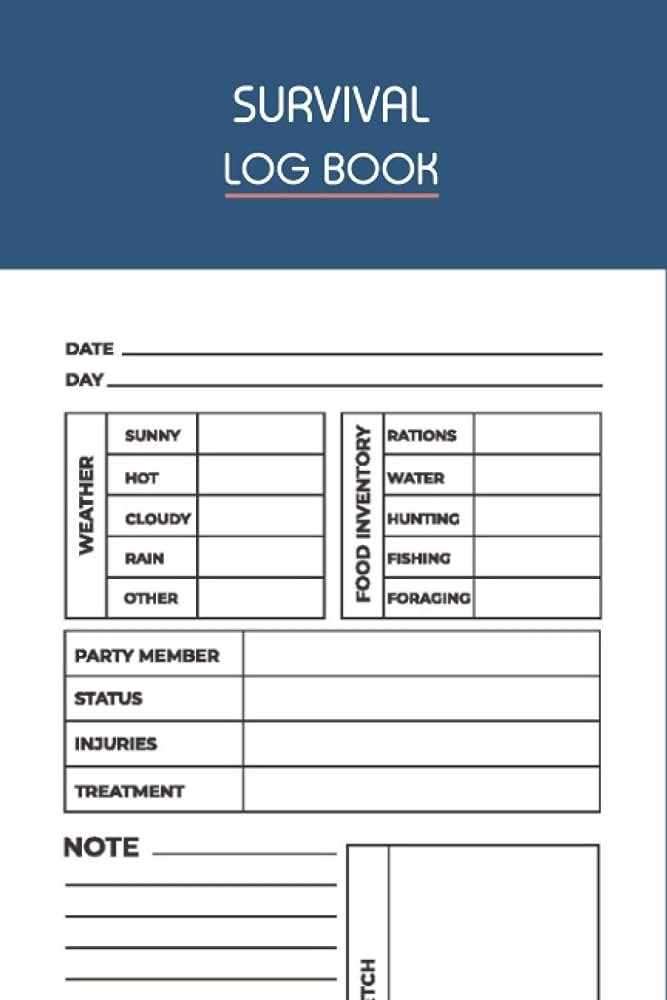Are you interested in learning the skills and techniques needed to survive in the wilderness? If so, then starting your journey as a survivalist might be something you’re curious about. Whether you’re an outdoor enthusiast or just wanting to challenge yourself, becoming a survivalist can give you the knowledge and confidence to tackle unexpected situations. In this article, you will discover tips and advice on how to begin your journey as a survivalist. From learning essential survival skills to finding resources and like-minded individuals, there are plenty of ways to dive into this exciting and rewarding adventure. So, if you’re ready to embark on a journey of self-reliance and exploration, keep reading to find out more!
Curious to know more about how you can start your journey as a survivalist? This article will provide you with a comprehensive guide to get you started on the path to becoming a skilled and knowledgeable survivalist. You’ll learn about the essential skills you need, such as shelter-building, fire-starting, and navigation. We’ll also explore the importance of preparedness and how to create a survival kit that suits your needs. Additionally, you’ll discover the various resources available, from books and online tutorials to survival schools and training programs. So, whether you’re eager to learn the basics or are looking to take your survival skills to the next level, this article will equip you with everything you need to begin your exciting journey as a survivalist. Stay tuned!

This image is property of www.pcinvasion.com.
Understanding Survivalism
Survivalism is a mindset and lifestyle centered around being prepared for emergencies and crisis situations. It involves acquiring the necessary skills, knowledge, and resources to ensure survival in the face of adversity. In today’s uncertain world, more and more people are turning to survivalism as a way to gain self-sufficiency and peace of mind.
Defining Survivalism
Survivalism can have different meanings for different individuals, but at its core, it is about being prepared for any situation that may arise. Whether it’s a natural disaster, a societal collapse, or even a personal emergency, survivalists strive to be ready to face any challenge head-on. This means having the necessary skills, supplies, and mindset to adapt and overcome.
Importance of Survivalism
Becoming a survivalist is not just about doomsday scenarios or paranoid preparations. It is about taking responsibility for your well-being and the well-being of your loved ones. By taking proactive measures to be prepared, you can minimize the impact of unforeseen circumstances and increase your chances of survival.
In times of crisis, supply chains may be disrupted, emergency services may be overwhelmed, and access to basic necessities may become scarce. By being a survivalist, you can be self-reliant and less dependent on external resources. This sense of self-sufficiency can greatly reduce anxiety and provide a sense of security.
Benefits of Becoming a Survivalist
Aside from the practical benefits of being prepared for emergencies, there are numerous other advantages to adopting a survivalist mindset. By learning essential survival skills and developing a resilient mindset, you can become more adaptable, resourceful, and confident in your abilities.
Survivalism also provides a unique opportunity to reconnect with nature and develop a deeper understanding of the natural world. By spending time outdoors and learning wilderness survival skills, you can gain a newfound appreciation for the environment and develop a stronger sense of stewardship.
Developing the Survivalist Mindset
To embark on your journey as a survivalist, you must first develop the right mindset. Here are some key aspects to consider:
Embracing a Survivalist Mental Attitude
Survivalism requires a mental shift from a passive to an active mindset. It involves adopting a proactive approach to your own safety and security. This means being aware of potential risks and taking steps to mitigate them before they become emergencies.
Develop a sense of self-reliance and a belief in your ability to overcome challenges. Cultivate a positive mindset that focuses on problem-solving and resilience. By embracing the survivalist mental attitude, you can approach any situation with confidence and preparedness.
Identifying Risks and Threats
The first step in being prepared is recognizing the risks and threats that you may face. This will vary depending on your location and personal circumstances. Assess the potential dangers in your environment, such as natural disasters, civil unrest, or personal emergencies.
Research and stay informed about the risks in your area. Consult local authorities, emergency management agencies, and reputable sources of information. By understanding the specific risks you may encounter, you can tailor your preparations to be most effective.
Understanding Basic Survival Psychology
Survival situations can be mentally and emotionally challenging. Understanding how stress, fear, and panic can affect your decision-making is crucial. By learning about basic survival psychology, you can better manage your emotions and make rational choices in high-pressure situations.
Develop strategies to stay calm and focused during emergencies. Practice mindfulness techniques, deep breathing exercises, and visualization to help maintain a clear head. Be familiar with the psychological stages of survival, such as denial, acceptance, and adaptation. By preparing mentally, you can better navigate challenging situations.
Building Essential Survival Skills
Survivalism is not just about hoarding supplies; it is about developing practical skills that can sustain you when resources are scarce. Here are some essential survival skills to focus on:
Mastering Fire Starting Techniques
Fire is a fundamental survival tool. It provides warmth, light, and the ability to cook food and purify water. Learn different fire-starting methods, such as using matches, lighters, flint and steel, or friction techniques like bow drills or hand drills.
Practice your fire-starting skills in various weather conditions and with different materials. Familiarize yourself with different types of tinder and kindling to ensure success. Remember to always prioritize safety and follow proper fire protocols.
Acquiring Shelter Building Skills
Having a proper shelter is essential for protecting yourself from the elements and maintaining body temperature. Learn different shelter-building techniques such as using natural materials like branches, leaves, and debris, or using a tarp or emergency blanket.
Practice building shelters in different environments and weather conditions. Experiment with different designs and configurations to find what works best for you. By developing these skills, you can ensure your comfort and safety in the wilderness or during emergencies.
Learning to Find and Purify Water
Water is essential for survival. Knowing how to find and purify water is crucial in a survival situation. Learn to identify potential water sources such as rivers, lakes, and streams. Familiarize yourself with methods of water purification, such as boiling, chemical treatments, or using portable filters.
Practice your water-finding and purification skills to ensure you can access clean drinking water when needed. Remember that dehydration can be life-threatening, so never underestimate the importance of water in survival scenarios.
Stocking Up on Survival Supplies
While skills are vital, having the right supplies can also make a significant difference in a survival situation. Here are some essential items to consider:
Creating a Comprehensive Bug-Out Bag
A bug-out bag is a portable kit that contains essential items to sustain you for at least 72 hours. It should include items such as a first aid kit, food and water, a multi-tool, a flashlight, extra clothing, and a waterproof tarp.
Make sure to customize your bug-out bag to meet your specific needs and the potential risks you may face. Keep it easily accessible and regularly review and update its contents as necessary.
Stockpiling Non-Perishable Food
Having a stockpile of non-perishable food is crucial in case of emergencies. Aim to have a supply that can sustain you and your family for at least a few weeks. Choose foods that require minimal preparation, have a long shelf life, and provide essential nutrients.
Rotate your food supply regularly to ensure freshness and prevent spoilage. Keep in mind any dietary restrictions or allergies when selecting and storing food items.
Gathering Emergency Medical Supplies
Injuries and illnesses can happen at any time, so having a well-stocked first aid kit is essential. Include items such as bandages, antiseptic solutions, medications, and tools for minor surgical procedures if you have the knowledge and training.
Regularly inspect and replenish your first aid kit to ensure that all items are up to date and in working condition. Consider taking a first aid and CPR course to enhance your medical skills and knowledge.

This image is property of Amazon.com.
Navigating Outdoor Survival
Survivalism often involves spending time in the great outdoors. Here are some essential skills to help you navigate your surroundings:
Understanding Basic Navigation Techniques
Being able to navigate your environment is crucial in both wilderness and urban survival scenarios. Learn basic navigation techniques such as using a compass, reading maps, and familiarizing yourself with landmarks and natural signs.
Practice navigating in different terrains and environments. Use maps and compasses during hiking trips or outdoor adventures to enhance your skills. Knowing how to orient yourself and find your way can be a lifesaver in many situations.
Learning to Read and Use Maps
Maps are essential tools for navigation in both wilderness and urban settings. Learn to read and interpret different types of maps, including topographic maps and street maps. Understand key elements such as scales, symbols, and contour lines.
Practice using maps to plan routes and navigate to specific locations. Familiarize yourself with map-reading techniques such as triangulation and dead reckoning. By mastering these skills, you can confidently find your way in the most challenging environments.
Mastering Wilderness Survival Skills
Whether you are hiking in the wilderness or facing a survival scenario, knowing essential wilderness skills can greatly increase your chances of survival. Learn skills such as foraging for wild edibles, identifying medicinal plants, building traps and snares, and signaling for help.
Practice these skills in controlled environments and under safe conditions. Consider taking courses or joining wilderness survival workshops to learn from experts and gain hands-on experience.
Preparing for Natural Disasters
Natural disasters can strike unexpectedly, causing widespread damage and disruption. Here are some steps to prepare for potential natural disasters:
Identifying Common Natural Disasters
Research and understand the natural disasters prevalent in your region. These may include hurricanes, earthquakes, tornadoes, floods, or wildfires. Learn about their characteristics, warning signs, and potential impacts.
Stay informed about local emergency management plans and evacuation procedures. Knowing what to expect can help you make informed decisions and take appropriate measures to protect yourself and your loved ones.
Creating a Personal Emergency Plan
Develop a comprehensive emergency plan that outlines what to do before, during, and after a natural disaster. Include details such as emergency contacts, evacuation routes, designated meeting points, and essential supplies.
Communicate your emergency plan with family members and ensure that everyone understands their roles and responsibilities. Practice drills and simulations periodically to ensure everyone is familiar with the procedures.
Securing Your Property for Potential Disasters
Take steps to mitigate potential damage to your property in case of a natural disaster. Secure heavy furniture, install storm shutters or impact-resistant windows, reinforce doors, and trim trees and branches that may pose a danger during high winds.
Ensure you have appropriate insurance coverage for your property and belongings. Take inventory of your possessions and keep important documents in a safe, waterproof location. These precautions can help minimize losses and facilitate recovery after a disaster.

This image is property of Amazon.com.
Acquiring Self-Defense Skills
In certain survival situations, self-defense skills become essential. Here are some aspects to consider:
Learning Basic Self-Defense Techniques
Self-defense skills can provide you with invaluable protection during emergencies or potentially dangerous encounters. Enroll in self-defense classes to learn basic techniques such as strikes, blocks, and escapes.
Practice these techniques regularly to improve your proficiency. Remember that self-defense should always be a last resort and avoiding dangerous situations whenever possible is the best course of action.
Understanding Non-Lethal Weapons
Non-lethal weapons can be valuable tools for self-defense without the risk of causing fatal harm. Educate yourself about non-lethal options such as pepper spray, tasers, and personal alarms. Familiarize yourself with their proper use and legal restrictions in your area.
Consider carrying non-lethal weapons that align with your comfort level and legal obligations. Remember, proper training and responsible use are crucial when utilizing any self-defense tool.
Equipping Yourself for Personal Safety
Beyond self-defense skills and weapons, proper personal safety equipment can enhance your level of preparedness. Items such as personal alarms, keychain flashlights, and emergency whistles can provide an extra layer of security.
Consider investing in sturdy footwear, protective clothing, and accessories such as gloves or hats to protect yourself from environmental hazards. Prioritize your personal safety when preparing for emergencies.
Joining Survivalist Communities
Being part of a survivalist community can provide invaluable support, knowledge exchange, and opportunities for growth. Here’s how you can connect with like-minded individuals:
Finding Local Survivalist Groups
Search for local survivalist groups or prepper communities in your area. Look for online forums, social media groups, or community organizations dedicated to survivalism. Engage with members and participate in discussions to learn from their experiences.
Connect with people who share similar interests and values. Attend local meetups or gatherings to network with fellow survivalists and expand your support system.
Networking with Like-Minded Individuals
In addition to local communities, online platforms offer opportunities for networking and support. Join survivalist forums, Facebook groups, or online communities to connect with like-minded individuals from around the world.
Engage in discussions, share experiences, and ask questions. There is a wealth of knowledge and expertise within the survivalist community, and connecting with others can be a valuable source of information and inspiration.
Participating in Survivalist Training Events
Survivalist training events and workshops are excellent opportunities to enhance your skills and knowledge. Look for local or regional training events where experts share their expertise in various aspects of survivalism.
Participate in hands-on activities, attend lectures and demonstrations, and engage in group exercises. These events not only provide valuable learning experiences but also offer opportunities to meet fellow survivalists and build lasting connections.

This image is property of Amazon.com.
Putting Your Survival Skills to the Test
To truly become a capable survivalist, you must put your skills to the test. Here are some ways to challenge yourself and continue growing:
Planning and Conducting Practice Scenarios
Create practice scenarios that simulate real-life emergencies. Set up challenges that require you to apply your survival skills in a controlled environment. Prepare for various scenarios such as wilderness survival, urban emergencies, or natural disasters.
Practice your skills regularly and take note of areas where you can improve. Use these practice sessions to fine-tune your techniques and identify any gaps in your knowledge or supplies.
Participating in Wilderness Survival Challenges
Consider participating in wilderness survival challenges or competitions. These events push your skills to the limit and allow you to demonstrate your abilities in a competitive setting.
Look for reputable organizations that offer survival competitions or endurance events. These challenges often incorporate elements such as navigation, shelter-building, fire-making, and foraging. Participating in such events can provide a valuable learning experience and help you gauge your progress as a survivalist.
Taking Advanced Survival Courses
Continue your survival education by taking advanced courses and certifications. Look for courses that focus on specific skills such as wilderness medicine, advanced fire-making techniques, or tactical survival.
Investing in your education and acquiring advanced skills can make you more versatile and well-rounded as a survivalist. Seek out reputable training providers and learn from experienced instructors who can provide expert guidance and mentorship.
Conclusion
Starting your journey as a survivalist begins with embracing the mindset and developing essential skills. By understanding the principles of survivalism, building your knowledge base, and creating a practical preparedness plan, you can become more self-reliant and confident in your ability to face any challenge that comes your way.
Remember, survivalism is not about living in fear, but rather about taking control of your own safety and well-being. By investing time and effort into learning and practicing survival skills, you are equipping yourself with the tools necessary to thrive in both everyday life and extraordinary circumstances. So start your journey today and embrace the world of survivalism.

This image is property of miro.medium.com.
